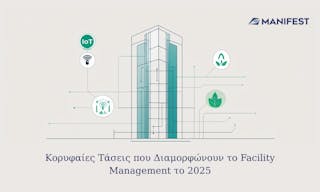
Top Trends Shaping Facility Management in 2025
As 2025 unfolds, Facility Management is undergoing a profound transformation. Technologies such as the Internet of Things (IoT), Artificial Intelligence (AI) and advanced building automation converge with a growing commitment to sustainability and integrated service models, delivering workplaces that are more efficient, flexible and eco-friendly.

Smart Technologies & IoT
Digital transformation is accelerating the rise of smart buildings. IoT sensors and Building Management Systems now stream real-time data on equipment performance and energy use, shifting operations from reactive fixes to predictive insight. When these data flows feed “Smart FM” platforms, resource allocation is optimised and operating costs fall, while automated lighting, heating and cooling enhance occupant experience.
Artificial Intelligence & Predictive Maintenance
AI is a genuine game-changer. Machine-learning algorithms mine historical records and live sensor feeds to predict failures in lifts, HVAC units or generators and pinpoint the ideal maintenance window. Facility teams can therefore act proactively, avoiding downtime and cutting costs. In the human-in-the-loop model the manager stays in control, but AI delivers speed and precision to every decision.
Sustainability and Energy Efficiency
Sustainability has moved from peripheral concern to strategic imperative. Facility leaders invest in LED retrofits, smart HVAC controls and on-site renewables to cut consumption and meet ESG targets. Real-time energy monitoring exposes waste and supports rapid interventions, while regulatory pressure toward net-zero operations turns Green FM into mainstream practice that pairs environmental benefit with measurable financial return.
Integrated Services & Outsourcing
Integrated Facility Management is gaining ground as organisations hand non-core functions to specialised partners. A single point of contact, unified processes and consolidated data create synergies that can trim operating costs by up to 15 percent while tightening quality control through clear SLAs and KPIs. Uniting more than fifteen suppliers under one umbrella drives central oversight, transparent energy tracking and consistently higher service standards.
Conclusion
Facility Management in 2025 is defined by digital innovation and strategic alignment with sustainability goals. The fusion of IoT, AI and energy-focused solutions produces buildings that anticipate, adapt and conserve. At the same time, integrated service provision frees enterprises from operational complexity so they can focus on their core mission. Together these trends position Facility Management as a strategic partner, securing workplaces that are efficient, intelligent and sustainable for the future.